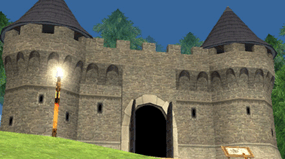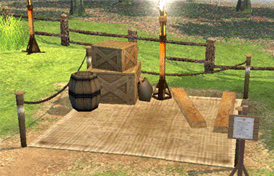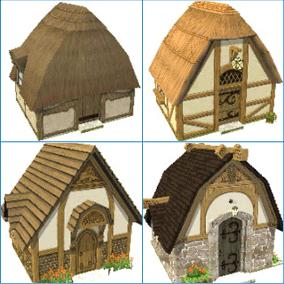Mabinogi World Wiki is brought to you by Coty C., 808idiotz, our other patrons, and contributors like you!!
Keep this wiki going by contributing to our Patreon!
Guild Castle
| This article is incomplete. This article is incomplete, and may require expansion or cleanup. Please help to improve the article, or discuss the issue on the talk page. |
- As of the Auction House update on 04/05/2018 all guild castles have been set to 'Royal Possession' and no longer are up for auction.
- Guilds may no longer manage housing districts.
- The housing districts still work as normal, though house auctions are all set to the same day across all districts. Any vacant house will be put up for auction shortly after the previous auction ends. This is done automatically by Nexon America.
- Marketplace Shop taxes are set to 15%, and all shops pay a 30,000 Gold weekly tax.
Castle Information
- There are four castles available per server;
- Dugald Castle which oversees housing in the neighbouring Dugald Marketplace, where the town can be accessed from Dugald Aisle.
- Sen Mag Castle which oversees housing in the neighbouring Sen Mag Marketplace, where the town can be accessed from Sen Mag Plains or Morva Aisle.
- Abb Neagh Castle which oversees housing in the neighbouring Abb Neagh Marketplace, where the town can be accessed from Abb Neagh or Emain Macha.
- Sliab Cuilin Castle which oversees housing in the neighbouring Sliab Cuilin Marketplace, where the town can be accessed from Sliab Cuilin.
- Each castle's area map includes a Moon Stone site and a Moon Stone Piece mined from a particular site will instantly return a player to that specific castle.
- A player can instantly transport to all four residential towns via a Housing Flyer, where a flyer will transport a player only to the town of the house it was advertising.
- All four guild castles have been set to Royal Possession by Nexon and housing auctions are set automatically.
- Guild Castle Dungeon passes can still be bought for 1,000 gold.
- For more information on guild castle dungeons see Castle Dungeons.
- A player may not enter the 'Security Office' of any castle, when tried they are met with a prompt that says they can't enter the office of an empty castle.
Renting Houses
- See Housing for more details on owning a house.
- Housing taxes seem to be fixed around 10% (More data is needed)
Guild Castle Management

|
As of 2018, the content in this section is no longer a feature of Mabinogi. |
Guild Castles used to be managed by the Guild that won the bid on the building. The castle would then have to be built by that guild's players.
Castle Building
- A castle was built in three stages. Each stage had a time limit.
- The stage had to be completed before the time was up or else the castle would be forfeited.
| Castle | Requirements | Time limit (Real-time) |
|---|---|---|
| Dugald Castle | Stage 1: Wood Board x100 , Firewood x100, Large Nail x100 | 3 Days |
| Stage 2: Iron Bar x100, Iron Plate x100 | 2 Days | |
| Stage 3: Castle Masonry x1,000 | 2 Days | |
| Other Castles | Stage 1: Wood Board x50, Firewood, Large Nail x50 | 2 Days |
| Stage 2: Iron Bar x50, Iron Plate x50 | 2 Days | |
| Stage 3: Castle Masonry x2,000 | 3 Days |
- Construction begun once the materials are dropped in the loading zone, which is marked by ropes. Excess materials could be regained later.
Castle Administration
- The guild master can set the price of the pass to the castle dungeon by talking to the guard in the castle. The maximum price is 10,000G.
- Guild members can receive the pass for free.
- The guild master may deny the sale of passes to the public.
- The castle has a guild stone in it which functions as a normal guild stone with some extra management options for the guild master. The sign in front of the castle also has these management capabilities.
- The castle has a guest list feature. With it, the guild master may permit or block individual users and other guilds from entering the castle.
- The castle has its own bank into which revenue from leasing houses is placed. The guild master may only move this money into the guild's bank with the guild members' approval, via a voting poll.
Building and Renting Houses
- The guild could build houses on the land and rent them to players. Up to 260 houses could be built per area.
- There are 4 different types of houses that could be built.
- Here are the lowest prices and example taxes for their construction:
| House Type | Min. Construction Cost | Designated Tax Rate | Weekly Taxes Due |
|---|---|---|---|
| Earthen House with Ventilating Thatched Roof | 68,500g | 10% | 6,850g |
| 30% | 20,550g | ||
| Earthen House with Thatched Roof | 138,600g | 10% | 13,860g |
| 30% | 41,580g | ||
| Earthen Brick Cottage with Shingle Roof | 382,600g | 10% | 38,260g |
| 30% | 114,780g | ||
| Brick House with Tiled roof | 737,600g | 10% | 73,760g |
| 30% | 221,280g |
- For simplification, Type of the house will be referred to T1(cheapest) to T4(most expensive).
- The rent could be set from 10%-50% in increments of 1%. The system would always get 10% of the player's winning bid price from the rent, and the guild got what was left over.
- Once a house was built, the guild could auction it off to be temporarily owned by other players.
- A guild could not directly fix the auction so that a member or friend won the house. The winner was always the highest bidder.
- The guild could, however, provide money to the friend bidding to help ensure that the friend had the highest bid.
- Houses have different roof configurations that could only be changed at construction time and could not be remodeled by the winning bidder. The most expensive configuration of a T4 house is 890,600, versus 737,600 for the default (cheapest) configuration. T1 houses have no roof options.
- A guild could not directly fix the auction so that a member or friend won the house. The winner was always the highest bidder.
Guild Castle Loss
- A guild castle had durability, much like equipment, and deteriorated over time. When it ran out of durability, the castle went up for auction again.
- The next guild to own the castle could keep or destroy the houses built by the previous guild.
- All the assets and costs that had been paid for bidding on the manor and obtaining materials for the castle were non-refundable and non-reimbursable.
Gallery



